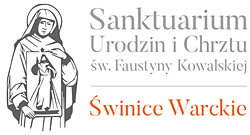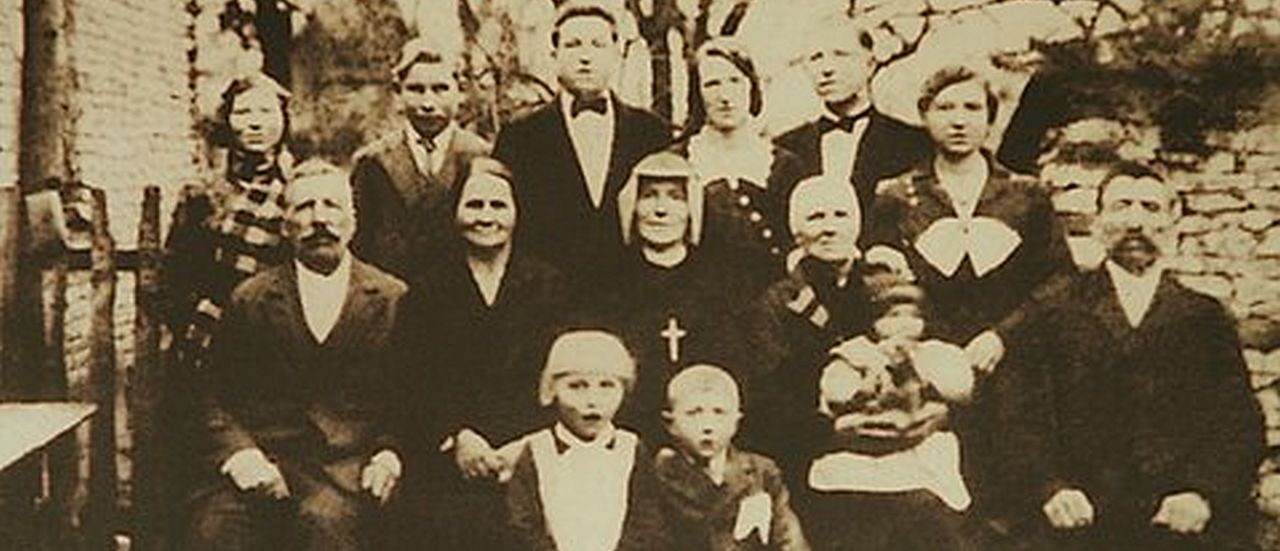Childhood ...
Helenka’s parents met in the nearby town of Dąbie nad Nerem, where they received the Sacrament of Matrimony in 1892. Several years after their wedding, they purchased a small piece of land in the village of Głogowiec, where they built on their own a house from the local white stone, featuring a few bricks.
These days, the family house of St. Faustina is owned by the Parish. It is visited by pilgrims who bring here their prayers, asking the Mystic of Głogowiec for intercession for their families, entrusting to her particularly painful mysteries of life.
The cottage had a thatched roof; it had one room, kitchen, hall, and woodworking workshop, where Stanisław used to work. Close to the house there was a well and bread oven, in which Marianna was baking fragrant loaves of bread on burdock leaves; and a small garden with various flowers and fruit trees blossoming in spring. A small shrine was mounted on one of them, which served as an inspiration for prayer to the little Helenka.
Helenka loved to pray since her early years. When she was seven years old, she heard God’s voice in her heart, calling her to a better life. It was during a Vesper Service, in the Parish Church, before the exposition of the Blessed Sacrament for adoration (Diary, 1404).
It was in the seventh year of my life that, for the first time, I heard God’s voice in my soul; that is, an invitation to a more perfect life. But I was not always obedient to the call of grace. I came across no one who would have explained these things to me.
(Diary, 7)
When she was nine, she had her first Confession and Holy Communion. The sacraments were administered to Helenka by Fr. Roman Pawłowski. A 19th-century confessional is the silent witness of those moments. Fr. Roman was executed by Germans in the beginning of World War II. The place of execution was the Kalisz market square, in front of St. Joseph’s Basilica. It’s worth remembering that three other parish priests working in Świnice Warckie before the war were murdered by the occupying forces; two of them were gassed in the German concentration camp of Dachau.
A story about the little Helenka coming home after the First Communion has survived to this day. A neighbor who saw her coming back home alone from the church was very surprised. – I am not walking alone! I walk with Jesus! Such mature answer was given by the little Saint to her neighbor.
Helenka’s parents had a big influence on her faith, particularly her father. Reading the notes of the Diary, we can say that for his family he was a priest showing the path to salvation, a householder aware of his dignity and responsibility for his vocation before God.
The praise of her fervent prayer was explained in the “Diary,” in the paragraphs describing the arrival of Sister Faustina to her dying mother. When Christ in a miraculous way, through the service of His Chosen One healed the terminally ill Marianna, those gathered in the house of Głogowiec fell on their knees seeing the great miracle made by God. Looking at her father, Faustina expressed her great recognition, which should encourage deep reflection among husbands and fathers arriving to the shrine of baptism of the Apostle of Divine Mercy.
When I saw how my father prayed, I was very much ashamed that, after so many years in the convent, I was not able to pray with such sincerity and fervor. And so I never cease thanking God for such parents.
(Diary, 398)
During the end of her stay in the family home in 1935, Sister Faustina was thanking God in her parish church for all graces she received here. Then, the Merciful Jesus told her the famous words that are inscribed on the rood screen of the church.

Helena Kowalska – known in the convent as Sister Mary Faustina
– was the third of ten children of Stanisław (d.1946) and Marianna (d.1965).

Helena’s birth certificate is written in Russian as it was a time of partitions.
Under the birth certificate one can see a clear and legible signature of Helena’s father,
which testifies to the fact that he was literate.









